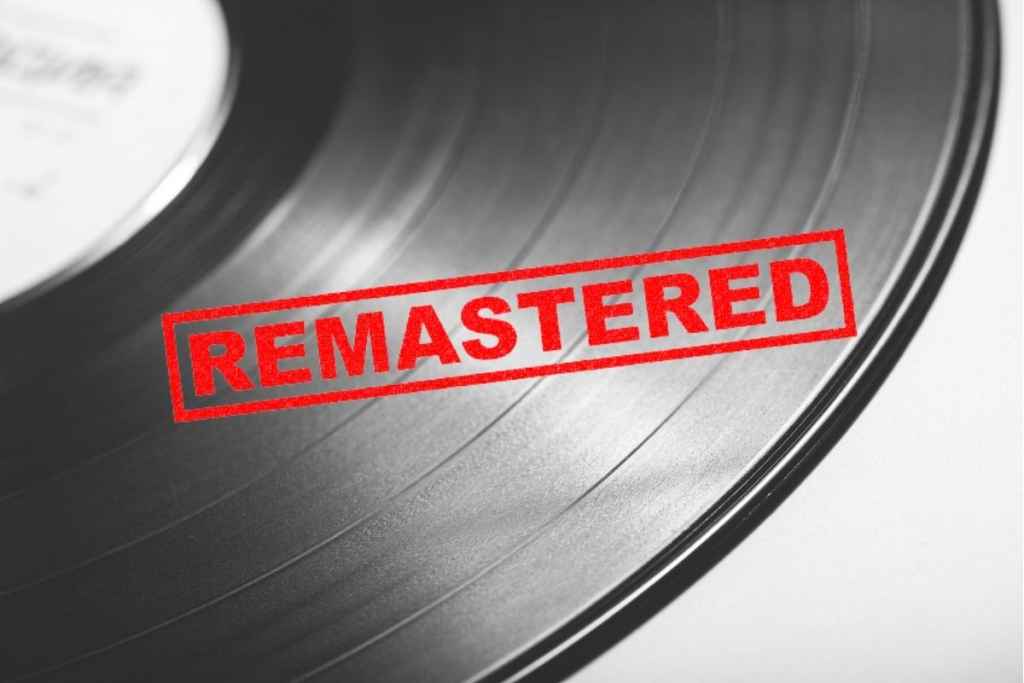Remastering audio is all about improving the sound quality of the original track’s copy. For providing a more refined, cleaner, and sharper listening experience, remastering engineers remove flaws from the music, giving them an optimal sound and bringing it in-line with current music standards.

Table of Contents
What Is Remastered Audio?
Today vintage performances by great musicians and artists are making a comeback to the music industry with flaws being reworked and clear notes to add to new listeners music enjoyment.
Audio remastering mainly updates the soundtrack’s quality, adding in any recent advancements to the track.
The mastering engineer makes use of modern technology and techniques to improve sonic quality, including stereo image optimization, limiting, compression, and the use of equalization.
How to Remaster Audio?
The mastering engineers use digital copies of the soundtrack from the digital audio workstation (DAW) to remaster music.
At first, they listen through the track and then make necessary adjustments to update the sound quality. Walking through the steps:
- The remastering process starts with the ordering of tracks that ensure a musical flow, in such a way that each song contrasts with the ones that come before and after it.
- Next, the engineers use noise reduction to subdue or eliminate sounds like hums, clicks, whistling, dropouts, microphone pops, hisses, and lisping sounds formed with poor recording equipment and old techniques.
- Now, the audio at the third stage uses peak limiting and compressing to eliminate muffled effects and improve loudness. Overall, it creates an enriching soundtrack with bass and treble sweeteners, making it an enjoyable treat for the ears.
- In the end, the engineer uses an equalizer to reduce audio frequencies to achieve tonal balance. The process gets you better harmonies and beats.
- These changes are finalized before being sending it out for final approval.
Why is Audio Remastered?
With music lovers often getting into debates that original tracks are way better than remastered ones, then why do we remaster songs?
Remastering audio improves the overall sound quality of the original recording without altering its original charm.
Also, it makes the music available in other formats so that loyal fans can once again collect their favorite albums in the format they prefer.
With new audio encoding formats becoming popular, older recordings created with analog technology need to be remastered into digital formats.
Imagine you want to listen to a music album released in the 1920s on your MP3 player. It seems impossible as the music production back in the 20s was not advanced enough to meet the digital equipment of today’s era.
Therefore, without remastering of older tracks, that precious work will never be heard by most of today’s listeners.
With the increasing technological advancement, it is necessary to remaster the audio before redistributing its copies in the market. Whenever the remastering process is done by an experienced technician who knows what they are doing, it can vastly improve the song’s/music quality.
Is Remastered Music Better?
The answer is very subjective of course as it depends on the listener’s choice.
Some prefer the organic tone with scratchy recordings, while others find modern and crisp-sounding remasters better. Mostly, the purpose of remastering music is to improve it without changing its delivery style.
The remastering process adds a new responsiveness to those old recordings and raises their level to the current standard that modern music lovers expect.
The remastering technique eliminates those problems from the recording that wasn’t possible to achieve at the time of the original recording.
Most listeners find remastered music better than the original track. Still, some audiophiles can’t get over the charm of the pure soul of the original track.
The character that sets those older recordings apart from this new generation of music often can’t be removed from the classic song without making it sound more sterile and bland.
So, it is the engineer’s art to remaster the original masterpiece without removing that soul of the song, as best they can
Are Original Soundtracks Better?
There are plenty of reasons to remaster old audio or songs?
But even then, many listeners argue that original tracks sound way better than the remastered version.
They validate their point by saying that the original masterpiece is created the way that artist wanted it to be. Although the original track lacks the high-quality music standards of today’s era, it still holds the golden charm and authenticity of its time
Still today, many music lovers prefer that old tone and feel it’s way superior to modern sound quality.
These music lovers are happy with original masterpieces and really don’t prefer remastering unless it needs to be exported in a different listening format.
Drawbacks Against Remastering Audios
Unfortunately, remastering audio cannot be a perfect process. At times, the noise reduction reduces the high frequency of the recording, resulting in dulling of the treble.
Similarly, an increase in sound level distorts the original track and even stresses the ear. That has led to many popular old songs failing on their relaunch.
Remastering music is an art that requires skill, tools, and experience. Even the slightest increase in sound levels or overuse of equalization can decrease its listenability and quality rather than increase it.
Sometimes songs are remastered to achieve better sounding on poor-quality listening devices, which undermines the overall quality of the masterpiece.
A song remastered for playback on high-quality devices won’t sound as perfect on low-quality devices. Neither would it work the other way round. So it is impossible to remaster a song that sounds perfect on every music device.
In that case, engineers try to find a middle ground, which sometimes leads to missing out on some of the incredible ambiances of an original recording.
Those missed out surrounding noises and colors create the feel of that song and removing those precious ambiances harm the track.
Therefore, at those times, people prefer the original recordings.
They may not sound as polished and perfect as modern recordings, but their quality remains unaltered over most platforms.
Summary
Remastered audio is a term often used in the music industry.
The process digitally alters poor-quality or older recordings to match modern music standards.
Older music can gain huge followers in the modern age, while allowing compatibility with all modern listening devices and music platforms.
A remaster engineer works like an artist to make an audio treat for a music lover’s ear.
While some listeners find original tracks better, others prefer the remastered versions.
In some cases, remastered music is not a lot different or better than the original recording. However, remastering does allow the listener to enjoy the music on any device they choose to listen on.

